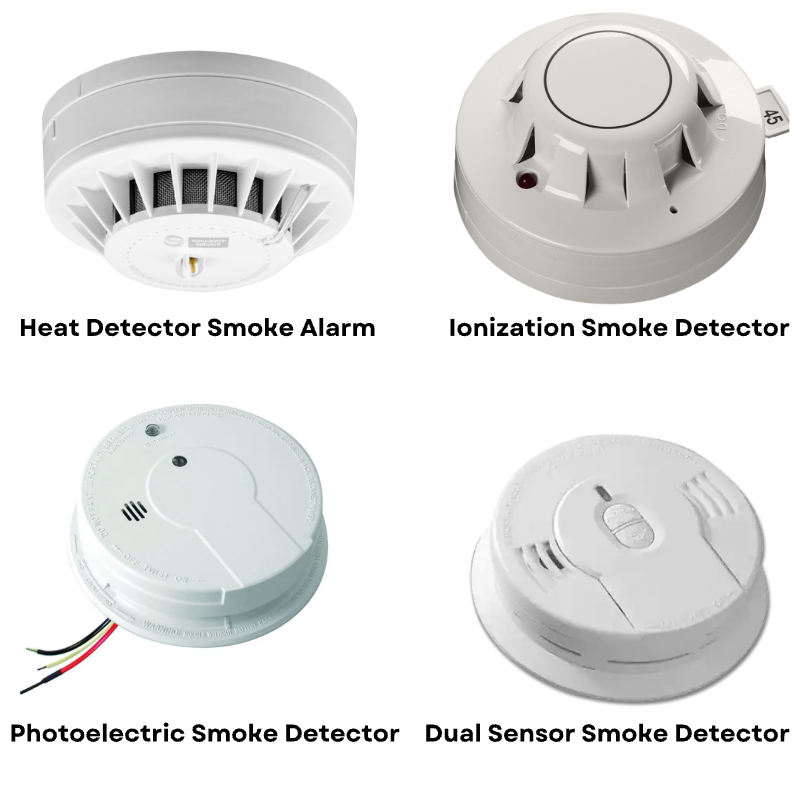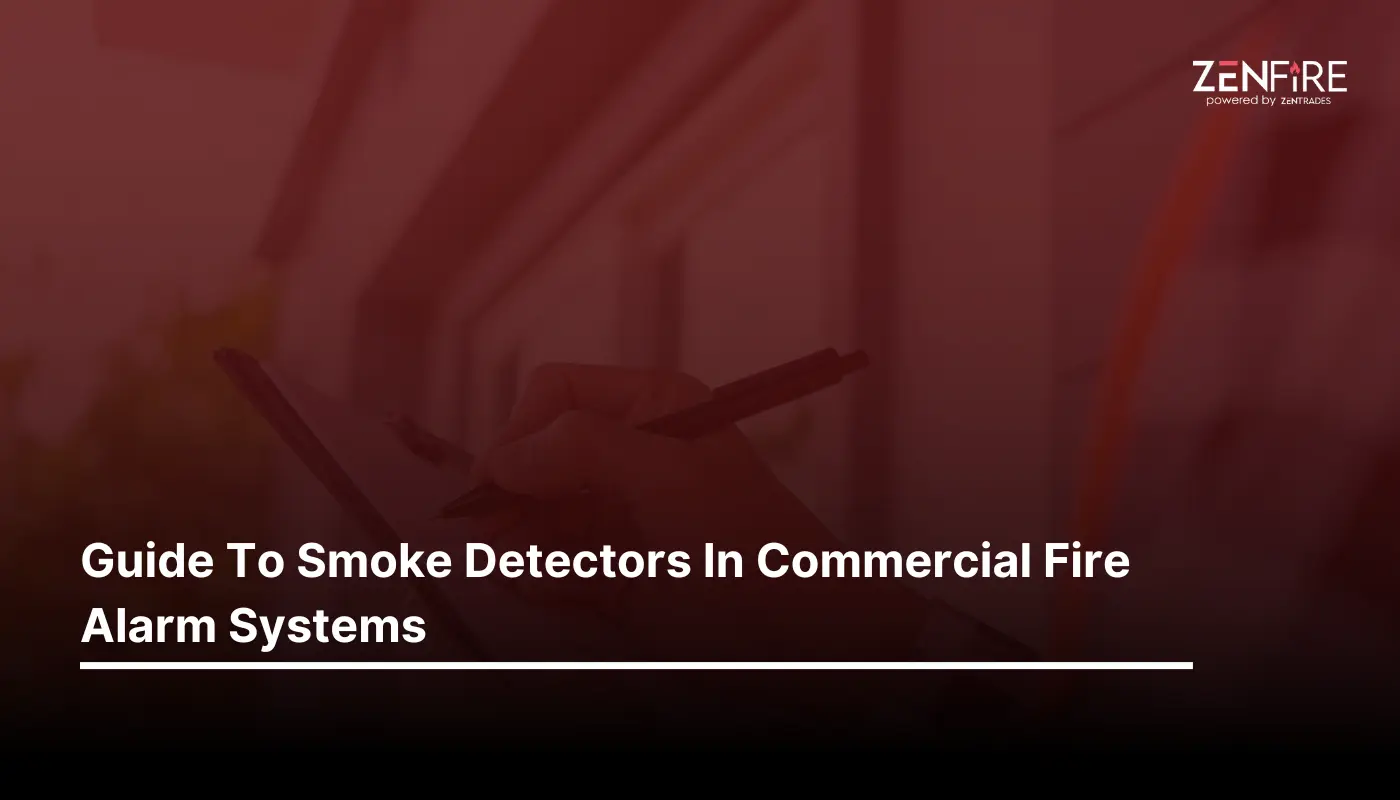Guide To Smoke Detectors In Commercial Fire Alarm Systems
- Field Service Management
- 9 Min Read
A commercial building needs an adequate fire alarm system to establish an efficient fire protection system. Without it, the safety of its occupants, staff, and the property itself is endangered and exposed to severe fire hazards.
A commercial establishment differs from a residential quarter in ways like incorporating valuable assets, official documents, employees, staff, and visitors. The entire responsibility of safeguarding these elements from accidental fires solely relies on the safety and fire protection systems equipped by the commercial property owner or manager.
In a commercial setting, fire safety and protection systems without smoke detectors is incomplete. Smoke detectors are an essential part of fire alarm systems, helping you detect the presence of smoke at the earliest stages. This ensures that the occupants evacuate safely and protect themselves from exposing themselves to severe damage.
In this blog, we will discuss how many smoke detectors are required and the specific guidelines a smoke detector must follow in a commercial establishment. As a commercial establishment, the owner can ensure its safety.
Here What We Cover
Smoke Detectors in Commercial Fire Alarm Systems
In commercial fire alarm systems, a smoke detector is a must and is incorporated automatically into the alarm unit. Anytime smoke is detected in the air, smoke detectors get active. Upon detecting the smoke, these units send a signal to the alarm unit, upon which the fire alarms start emitting signals. These signals further help the occupants understand the graveness of the situation and commence the evacuation process.
Smoke detectors are essentially a super helpful tool in commercial establishments as a multitude of activities can be seen happening. Though different commercial establishments incorporate different activities depending on the business, one common thing is that people from other places come together to work on a single goal. It is a place where business happens, and as a business, it’s the owner’s responsibility to ensure that the occupants’ safety is guaranteed.

Use our free estimate template now
Make winning quotes in minutes—for any industry and any job.
Occupancy Types for Commercial Buildings
Requirements for commercial smoke detectors depend on the types of commercial properties and their occupancy type. The regulations for different occupancy types are different owing to the demography and purpose of the establishment.
There are 10 kinds of occupancy types for commercial establishments.
Assembly Occupancy: constitutes establishments like auditoriums, stadiums, halls, etc., where citizens assemble or gather.
Business Occupancy: constitutes business establishments like banks, offices, government institutions, etc.
Educational Occupancy: includes buildings for educational purposes like buildings for schools under 12th standard.
Factory and Industrial: accommodate industrial establishments or factories where items are produced and manufactured.
High-hazard: constitute industrial factories that manufacture, store, or produce hazardous materials that require strict fire safety compliance.
Institutional Occupation: This category includes institutions that require special care, such as hospitals, prisons, daycares, educational facilities and other places where assistance is required for egress.
Mercantile Occupancy: constitutes establishments or existing facilities used for buying or selling of goods like stores, markets, gas stations, etc.
Residential Occupancy: constitutes buildings for accommodation purposes.
Storage Occupancy: constitutes storage facilities for goods, materials, or any other nonhazardous substances.
Utility and Miscellaneous: This category comprises building types that do not fall under any of the occupancies mentioned above. Owing to their distinctive type, the requirements are variable in this case.
Basic Commercial Smoke Detector Requirements For All Occupancy Types
The National Fire Protection Association has outlined guidelines and requirements for installing smoke detectors in commercial fire alarm systems.
According to NFPA 72 and the International Building Code:
Installation Requirements
The law requires and mandates that smoke detectors be installed according to guidelines based on the building’s type, occupancy type, and potential fire hazards. It also mandates the installation of hardwired smoke detectors connected to the entire building’s electrical unit. Wireless smoke detectors are also allowed for extra protection and coverage based on situational requirements.
Placement Requirements
requires smoke detectors to be installed in every room, hallway, bathroom, storage area, etc. The number of smoke detectors required to be installed depends on your property’s size. However, installing as many smoke detectors as possible is suggested to provide enough coverage and minimize the chances of smoke not getting detected.
Maintenance procedures and requirements
Regular and periodic testing of your smoke detectors and fire alarm systems can help you ensure that your building’s fire alarm system functions properly and plays a vital role in fire detection. Batteries should be replaced at the right time for wireless smoke detectors and checked at regular intervals to avoid unit malfunctioning and inoperating.
Interconnection of Units
your wireless smoke detectors, fire alarms, smoke alarms, sprinkler system, emergency lighting, and all other units in your fire alarm and automatic sprinkler system must be interconnected throughout the property to ensure fire safety and automatically notify you in case of an emergency. This ensures that if one of your smoke detectors gets active, all other units receive the signal and alarm you to commence the evacuation procedure ahead of time.
In addition to these requirements, there are other miscellaneous factors that you should consider when planning to install smoke detectors in your fire alarm systems.
Building Size & Occupancy — Smoke detector requirements depend on the commercial establishment’s size and occupancy type. Larger or smaller buildings with a higher or lower number of occupants can have stricter or more lenient smoke detector regulations, respectively. Some industry establishments, for example, those falling under hazardous occupancy type, can have extra regulations to ensure better safety and fire protection.
Local Codes — Specific establishments, local authorities or area codes require additional rules and guidelines that might exceed the regulations provided by the NFPA.
Types Of Commercial Smoke Detectors For Commercial Fire Alarm Systems
Most commercial property owners and managers enable CCTV cameras to verify in case of false alarms. Hence, the correct smoke detector and fire alarm system should be installed considering the type of potential fire emergency in the building.
There exist 5 broad categories of commercial smoke detectors that can be installed in commercial fire alarms and security systems:
Ionization
These smoke detectors help locate fast-flaming fires caused by combustible materials. These fires are characterized by the rapid combustion of fuels with visible flames. These fires can generate significant heat, causing havoc and severe damage to lives and properties. Hence, these ionization smoke detectors are extremely helpful in this case of fire, as they are solely built to recognize the invisible particles that cause such fires.
These detectors function mainly with the help of the ionization chambers that ionize the air within them. When fire arises, the smoke enters the chamber, disrupting the flow of ions and the electric plates within it, triggering the smoke detector’s alarm system.
Photoelectric
Owing to their sensitivity, these smoke detectors are useful for commercial establishments with a higher occupant load. These units help identify fires caused by wiring issues or upholstery, characterized by slow and smoldering fires.
These units comprise a light source and a light-sensitive sensor in their chamber. When a fire is detected, smoke enters the chamber and causes the light to scatter. Some are redirected to the photosensor, which detects an increase in light sensitivity, triggering the alarm and indicating the presence of smoke in the room.
Dual Sensor
Combining the properties of both units mentioned above, these smoke detectors enable the detection of a broad range of fire types and applications. They offer full fire protection services across different buildings for various occupancy types, but most beneficially for commercial establishments with a large occupant load.
Heat Detectors
These detectors respond to temperature changes rather than smoke. They measure the average temperature in the event of a fire in their surroundings. They are wired at a specific temperature, serving the maximum threshold for the detector to signal the fire alarm system. The threshold is usually set at a higher temperature to avoid false alarms.
Heat detectors are beneficial for fires that produce no or significantly less smoke, like smoldering fires.
Video Smoke Alarm Detectors
As the name suggests, these detectors use video imaging technology to recognize fire and smoke. They are advanced smoke detectors that incorporate imaging sensors and enable trainer algorithms to detect the visual presence of smoke or fire.
These units can and must be incorporated with your fire alarm units into an interconnected system to enable real-time fire detection and rapid emergency response.

Get posts like this in your inbox.
Keep learning how to run a 5-star business with our bi-weekly newsletter.
Choosing The Right Type of Smoke detectors For your commercial fire alarm system
Selecting the right type of smoke detector for your commercial fire alarm systems can be challenging. Still, if you identify the potential fire risks in your building and are abreast of the local fire and building codes, you can easily recognize which smoke detector will be best for the purpose.
Although different parts of your establishment will require different kinds of smoke detectors owing to the purpose of the rooms, certain factors can help you establish which detection devices will be best suited.
Some factors that can help you choose the appropriate smoke detector:
Fire type
Occupancy type
Environmental and locational requirements
Area of Coverage
Notification requirements
Other Tips for Safe Smoke Detectors in Commercial Buildings
Other helpful tips for having an efficient commercial fire alarm systems in place:
To ensure they function correctly and alert occupants in their time of need, schedule regular and periodic maintenance of your fire alarm systems, including your wireless smoke detectors, fire alarms, wired smoke detectors, sprinkler systems, and visual alarms.
Make sure your fire safety tools and equipment are spread throughout the building. Smoke detector placement should be carefully done to ensure they cover all areas.
Your employees and staff should be provided safety and protection training on using fire safety tools and following a proper egress procedure.
Ensure your emergency lighting systems function correctly and exit routes are clearly marked for a safe evacuation process.
Availabity of portable fire extinguishers should be on each floor and throughout the building for essential fire safety.
Devise an emergency fire safety plan and ensure your staff is adept at it. Fire alarm systems should be monitored to ensure 24/7 protection and rapid emergency solutions.

Explore a better way to grow your business. Book a free demo now!
Get organized, win jobs, and wow customers.
Book A Free Demo with ZenTrades Today!
Related Reading
Why Your Field Software Management Software Needs QuickBooks Integration
ZenTrades Why Your Field Service Management Software Needs QuickBooks Integration Read More Request Demo...
Read MoreZenTrades How To Manage Electrical Service Agreements Like...
Read MoreZenTrades The Best 5 Jobber Alternatives In 2023...
Read More

